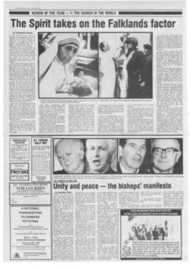Page 6, 24th December 1982
Page 6

Report an error
Noticed an error on this page?If you've noticed an error in this article please click here to report it.
Tags
Share
Related articles
Packing Parcels For Poland That Bring A Touch Of Joy
The Polish Bishops Answer
Admiral Attacks The ' Beirut Government
Political Chess And Fall-out In Poland
Five Hundred Polish Children At School In Britain
Poland has dipped below poverty level
"IF THE Pope is Polish, is he hungry too?" asked the little girl, while helping her mother wrap parcels for Poland. She was relieved to be reassured that he was not hungry. But the Polish people are.
On the anniversary of martial law in Poland, standards of living have dropped below the poverty level.
The chronic lack of protein and vitamins has produced acute anaemia and malnutrition especially among children and the elderly.
If there is a flu epidemic in the next few months, many may die. Rations are pitifully inadequate, when available. Bread is not a meal in itself.
There are no shoes in Poland.
They are exported to the West (at subsidised prices to undercut competitors). Foreign currency to prop up the Government is more important than the peoples welfare, though they are giving extra coupons of sugar, soap and detergents for Christmas. (To keep them clean and sweet?) A friend of mine in Gdansk has
recently married, but they do not expect to have children for many years, due to lack of food and space. Their 'love nest' is 3 x 4 metres, with shared use of a bathroom and kitchen. In her Christmas letter, she wrote:
"Life nowadays is as gloomy as the background of this card. (Black). But still, there is some light, light of hope, which helps us to endure with patience all the evil and injustice. I have had so many signs of God's care recently. I deeply believe His powerful hand rules everything."
Remember the miracle of the loaves and fishes? The generosity of one small boy, who shared his picnic lunch, enabled Our Lord to turn that into enough food to feed 5,000 hungry people, with plenty left over.
Can one person in every parish give the time and energy to organise a central point for clothes and shoes? Sue Ryder fills lorries, which would otherwise return to Poland empty. Lady Salisbury has a depot at Hatfield House. Send cheques (for food, toiletries, medical supplies at wholesale prices) to Help Poland Fund, National Westminster Bank, Hatfield, Herts. Can you drive a lorry, or send one?
We used to lead the world in charity. Can the church leaders persuade the Government to allow Freepost to Poland for the next few vital months? (Like Italy, France, Belgium and W. Germany).
Think of Poland, a beacon of light at the buffer zone, as you toil over your Christmas shopping, and enjoy Christmas cheer. Lets show our brothers and sisters in Christ that it is indeed more blessed to give than to receive.
Helen de Borchgrave London SW1
General absolution
IN HIS timely and sensitive reply on general absolution, (Question Box December 3) Fr Paul Sanders telescoped, unduly, it seemed to me, crucial penitential changes in our recent past. He alluded only vaguely to the authorisation, in 1914-1918, by which troops about to enter the lines could be absolved collectively without need for personal, individual confession.
World War Two brought new conditions. Pius XII not only confirmed (1) the old provisions (Consistorial, December 8, 1939) but, (2) extended them to include civilians in war-related work and therefore subject to attack (Sacraments, April 22, 1946). Also included were prisoners of war who were, of course, not in danger of death. But at that time "prisoners" were mostly Polish and they were forbidden by the Germans to confess in Polish.
Further (3) this was extended to Polish and Czech civilian workers in Germany (Sacraments, July 26, 1940). Lastly (4) the same possibility for general absolution was granted in favour of those civilian faithful who even if not in danger of death, would nonetheless otherwise be deprived for a long time of the consolation of the sacraments (Sacraments, December 22, 1941).
This applied above all to the so called Warthegau, Polish area annexed to Germany. Here in the scarcity of priests and the closing of churches, it often happened that Polish Catholics would walk for miles on Feast days only to find that the sole priest available could not possibly hear everyone's confession because of the crowds.
Many would-be penitents therefore had to retrace their steps without having been able to receive the grace of penance.
These precedents suggest that at times, in the mind of the church, auricular confession yields place to the yearning of the believer for the Sacraments. Is there no lesson here for us today?
The 1944 statement mentioned by Fr Sanders (Penitentiary, March 25, 1944) gives only a discreet idea of how far the liberalizations had actually gone and is certainly an insufficient basis for any conclusions.
Admittedly, these were wartime emergencies. But so were evening Masses, the reform of the Eucharistic fast and of Friday abstinence, and other pastoral innovations of Pius XII which we take for granted now.
Robert A Graham St Via di Porta Pinciana, 1 00187 Rome, Italy
Insights and Charismas
IN RESPONSE to Fr Stephen Wright (December 10) I would like to echo what he said. I too have come across several ex-Catholics who are, after a conversion experience, more at home among evangelicals where there is of course more emphasis on adult conversion.
They feel they have been "saved" or "born again".
A similar phenomenon is apparent when ex-Catholics are found among pentecostals.
They have experienced what they call "Baptism in the Holy Spirit" and then it is natural for them to seek the company of others who share this experience. I have done this myself for a time.
Of course there is plenty of traffic the other way. Quite a number of prominent Catholics in the Catholic charistmatic renewal are exProtestants. No doubt they are weary of evangelical preaching and appreciate the sacramental life in the Catholic Church.
There is indeed a long history of distinguished converts who entered the Catholic Church with an evangelical background. One might mention Dryden the poet and Cardinal Newman among others.
Progress in ecumenism is to be welcomed as part of God's greater plan that includes all Christians. But there is a serious unsolved problem for the Catholic Church in secular universities that Fr Stephen's letter hints at.
It is now difficult to advise Catholic students who wish to be active Christians in a university to stand aloof from the Christian Union which is the most flourishing body of Christians in most universities.
Similarly there is a reluctance on the part of students with a Catholic upbringing to make themselves known as Catholics in a university when it can seem unecumenical to do so.
It is not practicable for priests who are doing all a chaplain should do, to visit any particular institution of higher education more than once a week to say Mass.
So the Catholic presence in universities and polytechnics is small; many students cease to be Catholics and converts are now few. Were those Catholic bishops who were opposed to Catholics entering secular universities right after all? Patrick Carroll The City University, Northampton Square, London
THANK YOU for publishing Stephen Wright's letter, Dec 10, I am an Anglican from an evangelical background and am married to a Roman Catholic.
We both feel committed to the churches in which we grew up but we have never had any doubts that we worship the same God through Christ.
We have tried to share our faith and our church life with each other and our children as much as possible. We have a strong belief that, despite the difficulties, our spiritual lives have been greatly enriched by our differrent church emphases and experiences.
It is probably because of my background that we try to read the Bible and pray together every day; on the other hand the sense of worship at Mass was something new to me and has taught me a great deal. I found Stephen Wright's letter very encouraging.
As an Anglican I was naturally distressed to read in the same issue of the paper the reference by Malcolm Muggeridge in which he spoke of the Church of England as a corpse. To speak about the Church in that manner is to imply that the God of Life has abandoned it. I do not think any person should feel free to make this judgement.
Elizabeth Dwyer Sheffield.
London schools
We, the undersigned, are priests working in West London. All, in one way or other, are involved in schools and in the general field of education.
We have examined the recently published plan for the reorganisation of Catholic secondary schools in the ILEA Division I area. We have listened to the frustration and fears of both school staffs and parents, and believe that the proposed plan for the reorganisation is not the most just solution.
We believe the home is, by far, the strongest element in Christian formation and ILEA Division I is an inner city area where homes and family life in general have suffered breakdown and are open to all the pressures and problems of inner city life.
This is the plight of many of our Catholic parents. The catholic school, if it is to be successful in its aims, should offer the best and the most effective education to our children, living as many do, in deprived and difficult situations.
The present plan will not do this. Instead it will create two educational 'levels'.
We will have the selective system (even if we don't consciously set out to do so), expressed in the two 3FE schools, and we will have the inevitable secondary-modern type alternative in the two mixed comprehensives.
With the best will in the world we will be unable to prevent this gradual polarising of two distinct educational 'classes'. Catchment areas and quality of intake will, together, ensure that this will happen.
There is a strongly expressed concern in the inbalance of boys places and girls places. The new plan allows for 13 FEs for boys and only 8 for girls. The parental choice for a single sex girls' school is drastically limited, and, in reality, sometimes not available at all.
The plan is doubtful on educational grounds. The retention of five Catholic secondary schools in Division I seems to be unwise.
Educationalists argue that a 5 FE school is the minimum size for a truly comprehensive school. Others would argue that a 4FE is a possibility. Few agree that a 3 FE is viable. Would we not have been better advised to have opted for four schools instead of five?
What happens in 1988, when the projected fall in population forces us to reduce our reorganised schools by at least another 3 FEs? Can we project the effect the proposed plan will have on Catholic education in Division I at the end of this decade? We feel that the new amalgamated mixed schools will suffer seriously as time goes by.
There is no specific time given for the amalgamations. Nor has a definite site been found for the St Thomas More-St Edmunds amalgamated school. The uncertainty that this has caused in the minds of staff and parents is serious and unnecessary.
We conclude with an assurance that none of us has "an axe to grind". We write as people deeply concerned about the Church and the future of our children.
We admire the work being done in all schools in Division I, but feel very strongly that there ought to be a fair sharing of quality of intake and every other facility and support that the diocese can offer to our schools. The most urgent need is in the area of the deprived.
At a time of great financial stress, the Church must have a special concern for those who suffer most. There is no question, as has been suggested, of 'levelling down' the quality of our schools. We pay a lot of money for the privilege of having Catholic schools.
Because we have them, we ought to make them work, but each school, to be fully comprehensive, must be a real extension of the community in which it is based. It is our job to produce a just system in which schools have equal opportunity to grow and to develop and improve. This will only be possible if there is equal sharing of our resources. And, in the context of our schools, our children are our most valuable resource.
We would strongly urge the planners to think again. We do this in the sincere belief that the future of the young Church in West London will be seriously affected by the decisions. These decisions should be the concern of all of us who care for and love our Church.
Fr Anthony Coavery (White City) Fr William Dempsey (Kensal Rise) Fr Thomas Egan (St Charles Square) Fr John Formby (Shepherds Bush) Fr Robert Gates (Parsons Green) Fr Michael Hollings (Bayswater) Fr Thomas Kelly (St Charles Square) Fr Kenneth McCabe (The Lillie Road Centre and SLC) Fr Oliver MeTernan (Notting Hill) Fr Patrick Ryall, OSM (Fulham Road) Fr Gabriel Zaidi (White City)
Vietnamese refugees
The attention of the media has moved away from the needs of Vietnamese refugees resettling in this country. However, in Derbyshire a vital aspect of this work is continuing.
Refugee Action runs the only centre in Britain for family reunions of Vietnamese refugees. About 15,000 boat people have started a new life in Britain, but during their flight many families were split up. The Family Reunion Centre looks after new arrivals until they can join their newly-settled relatives throughout the country.
The only source of income for the centre is the Supplementary Benefit claimed on behalf of the refugees. As chairman of the Council for Social Responsibility in the Diocese of Derby, I should like to bring the work of the refugee action to the attention of churches throughout the country. We in Derbyshire endeavour to provide practical and monetary support for the centre, but those living in other parts of the country may well wish to make a donation to this work. Offers of help should be sent to Refugee Action, The Cedars Vietnamese Centre, Breadsall Hilltop, Derby. Refugee Action is a registered' charity in London No. 1593454.
R. S. Dell Chairman, Derby Diocesan Council for Social Responsibility, Full Street, Derby
Not without no lack of disregard
From Lord Hardinge of Penshurst I WAS interested and indeed pleased to read the reviews of crime novels by "MR", Sep 24 but I cannot resist sending a message about "shoddy editing".
John Wainwright is an old friend of mine. We have had much debate over the years about certain word usages and in particular of the word "irregardless". He maintains that it exists — I maintain that it doesn't. I think it possible though that given deep research MR will find that John Wainwright is strictly correct about this.
Hardinge of Penshurst
Six county deprivation
THE TENOR of Father Paul's letter (December 3) sadly reflects the material, rather than spiritual, stand of so many of the Ulster priests.
No one disputes injustices or the ,desire to return to a United Ireland, but injustice is not restricted to the six counties. I have never understood the Christian way of life to teach the redress of injustice by haphazardly maiming and slaughtering passers by or burning them alive.
So, it is shameful and hypocritical for the clergy to condemn carnage in one breath and excuse it in the next.
If only the clergy and population of the six counties could change places overnight with those in an area as deprived as Merseyside.
The transplanted Merseysiders would think themselves in paradise with public housing like Poleglass, magnificent recreation centres, beautiful surroundings (even in the city of Belfast one can see the mountains and the lough), social services much better than anything available on Merseyside, and well equipped good schools.
The Ulster people on Merseyside would get a quick sharp shock and would be screaming to get back to their six green fields in double quick time.
I know both the six counties and Merseyside very well indeed so I know what I am talking abour.
E Rodgers West Sussex
blog comments powered by Disqus











